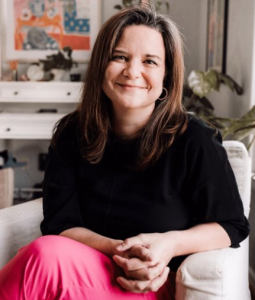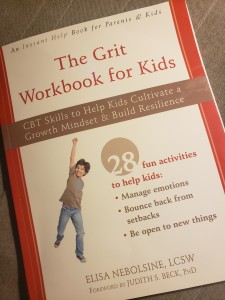Meet the Author: Elisa Nebolsine is Helping Teach Young People True Grit
Grit is defined as having “courage and resolve and strength of character.” National Association of Social Workers (NASW) member Elisa Nebolsine, LCSW, believes it is critical children and teens develop this skill to help them navigate our often complex and stressful world.
The Fall Church, Va.-based therapist said down with Social Workers Speak to talk about her new book, “The Grit Workbook for Kids: CBT Skills to Help Kids Cultivate a Growth Mindset and Build Resilience” (New Harbinger Publications).

Elisa Nebolsine, LCSW.
Q: Why did you decide to become a social worker?
Nebolsine: In college I volunteered at a day program for adult with chronic mental illness. I taught creative writing, and it was a life-changing experience. I went into the experience pretty scared about being around adults with this level of challenge, and I left in awe of how hard they worked and what kind, interesting and creative people they were. I was 20 years old, and I was just beginning to see how much depth and wonder exist in most people.
Q: And when did you first become involved so much in working with children?
Nebolsine: I went to Smith for graduate school, and one of the unique parts of their program is that you have two nine-month internships. You literally move to wherever your internship is and work full time in that placement. At the same time, your first year you build a community project and the second year you write your thesis. My first internship was with the child and adolescent unit of a psychiatric hospital in Vermont. This was in the nineties, and so much has changed since then with managed care, but at that time, kids would stay for weeks at a time. And while I was initially so disappointed to work with kids, I quickly changed my mind. Kids are kind of amazing. I learned that things I loved – creativity, playfulness, and curiosity – were a natural fit for kids. I also loved/love that when you work with kids you often have a team available to work together. You have parents/guardians, the school teacher, the pediatrician, whomever the family prioritizes, and I find it easier to help kids create change when we have this system around us to use.
Q: Do you think children today lack grit as compared to their parents and grandparents? If so why?
Nebolsine: First, let me be clear that this book and my work on this is intended for kids who don’t have a trauma history or haven’t dealt with systemic racism. I understand that there are concerns about trying to teach kids “grit” when we, as a society, have failed them.
But, do kids today have less grit? I’m not sure. The research shows that we, as a society, are more depressed, more stressed, and less happy than our parents and grandparents’ generations. This is fascinating as there have been so many “advances” that were supposed to improve our quality of life.
In recent decades parenting has shifted, and we’ve seen more and more of a tendency to over-parent. As a mom, I totally get it. We want to make things easier for our kids. But it seems that as we try to make things easier, the more we inadvertently make things harder. The ability to tolerate discomfort is such a necessary skill for all people, and when we become over-involved in our kids lives and seek to prevent pain, we unintentionally make it harder for them to tolerate pain.
There’s the concept of “interviewing for pain,” which is something parents do when they’re worried about their kids. So if Sam has a bad day at school, his dad goes asking him what difficulties he had. This is such an intuitive thing to do as a parent, but it ends up reinforcing this idea that kids can’t take being uncomfortable, and that we have to fix it for them.
One of the questions I ask every parent or guardian in my initial intakes is about their child’s ability to tolerate discomfort. How does their kid do on the basketball court when they’ve been playing for a long time and they’re super hot, or when they forget lunch and become super-hungry in the afternoon. I just want to get an idea of how well the kid can do tolerating being uncomfortable.

Book cover
Q: Why did you decide to write the book “The Grit Workbook for Kids”?
Nebolsine: As a person who works primarily with kids and anxiety, the ability to be able to be uncomfortable and persist- get through it- is so crucial. Anxiety is awful. It feels terrible, and it feels like the feeling will never go away. My main practice is about teaching kids to tolerate this discomfort with the knowledge that it will pass, and that they can get through it. I do a lot of exposure therapy with kids, and the entire idea of exposure is that you have to unlearn the feared response. If a kid can’t tolerate discomfort, this work becomes much slower and harder in many ways.
I decided to write the book because I, and my colleagues, were all seeing kids in our practices who struggled to keep going. They seemed to be too easily sidelined by emotional discomfort, and I knew from the research that there were things they could do that could help. Angela Duckworth changed the field with her work on grit. Carol Dweck’s work on mindset gave more applicability to the skills, and the field of cognitive behavioral therapy (my practice focus) provided the framework for the skills. It’s a natural blending of the three areas, and it gives kids real tools and skills they can use to build up their grit.
Q: What age group is the book aimed at and can children do the exercises in the book independently.
Nebolsine: The book is for kids age 6-12. That’s a big range, and it really depends on the individual kid if they can do it on their own or with help. It is written to be done independently, but I think there is huge value in doing the exercises with an adult with whom you can explore the ideas and your responses.
Q: Are you hoping other social workers who work with children will use it in their practices?
Nebolsine: I am hoping that social workers will use the workbook in their practices. As a social worker, I know how much we value tools that use evidence-based theory and practical skills. This book was written with the idea that it could be used as an adjunct to therapy. It certainly is something I use frequently in my practice.
Q: Also, do you think this is a good book for children who are in foster care?
Nebolsine: If those kids are struggling with persisting on things that they want to do and care about, then yes. I just want to make sure that it isn’t used as a tool to say “this is all on you, regardless on how we as a society failed, now you have to build your grit.” That isn’t why the book was written or it’s intention. It’s designed for kids who want to work on becoming more tolerant of discomfort in pursuit of a bigger goal they believe in.
Q: The nation is now focused on issues such as the #MeToo movement and our racial divide. Can the exercises in your book help children who are female or of color overcome situations of discrimination?
Nebolsine: I wish I could, but it honestly isn’t written to address those issues. I actually started this years ago. I wish I had done that, but I didn’t.
Q: Do you plan more books?
Nebolsine: Yes! I am currently under contract for a book for teens with the tentative title: “Your Amazing Teen Brain: CBT and Neuroscience Skills to Stress Less, Balance Emotions, and Strengthen Your Growing Mind.” It will also be published by New Harbinger and the release date is currently spring 2022. This book is written for teens, and uses neuroscience and lots of CBT to teach teen readers to understand what’s going on with their brains, why it matters (some examples: emotions are much bigger, risks are more appealing, and having a sense of meaning and purpose are crucial). It’s exciting to be doing this writing, and especially to be using CBT, my modality of practice, in the work. CBT is so applicable to social work- it’s ultimately about the client becoming their own therapist- and books are a great way to connect with a different audience.
Social workers help children live to their full potential. To learn more visit the National Association of Social Workers’ Help Starts Here Kids and Families section. NASW, with support of the Annie E. Casey Foundation, is also helping social workers, foster parents and others who work with youth better understand youth brain development.
Advertisement
Leave a Comment
You must be logged in to post a comment.


